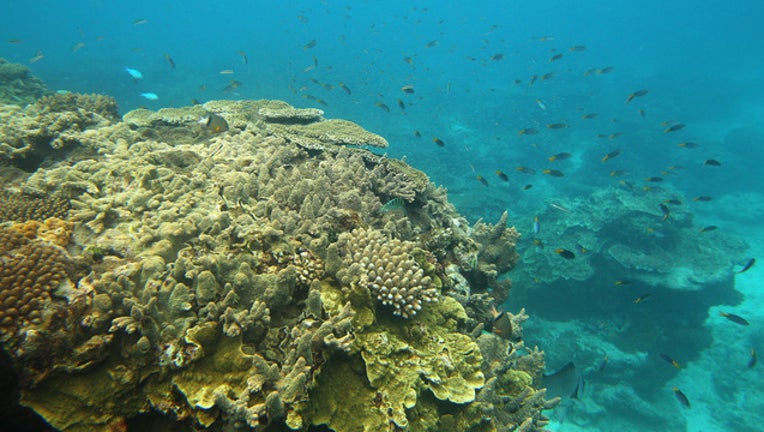Great Barrier Reef to be dumping ground for one million tons of sludge

Fish are seen swimming around coral formations on January 15, 2012 in Lady Elliot Island, Australia (Photo by Mark Kolbe/Getty Images)
HOUSTON (FOX 26) - Due to the deterioration of the Great Barrier Reef in recent years, Australia has passed strict legislation to protect it from further damage. However, the Great Barrier Reef Marine Park Authority (GBRMPA) has given North Queensland Bulk Ports Corporation Ltd (NQBP) the go ahead to dump more than one million tons of sludge in the reef, according to the Guardian.
Since the laws don't apply to materials originating from port maintenance, a loophole was found. This comes directly following severe flooding from the mainland, natural weather patterns that have already weakened the coral in the area, the BBC reports.
According to a statement from the GBRMPA, "maintenance dredging is necessary to remove sediments that have built up...without maintenance dredging, the Marine Park is left at a greater risk from accidents or grounding impacts of stranded vessels."
The sludge will be coming from from the seafloor near Hay Point Port, a large economic and industrial center for the country as well as a global hub for coal exports.
Dr. Simon Boxall from the National Oceanography Centre Southampton is concerned about the long-term impact of this industrial sludge on the coral's feeding habits and overall wellbeing.
"If they are dumping it over the coral reef itself, it will have quite a devastating effect. The sludge is basically blanketing over the coral," Dr. Boxall told BBC. "The coral relies on the algae, that's what give them their colour and what helps them feed - without this partnership the coral will suffer dramatically."
NQBP is confident that these new maintenance practices will have no significant environmental impact.
The GBRMPA statement announces that "the material excavated as a result of maintenance dredging, known as spoil material, is already present in the ecosystem, is naturally-occurring and composed of silt/clay, sand and gravel."
However, the final location of the sludge can cause problems, despite the organic nature of the material.
"If it's put into shallow water it will smother sea life," Dr. Boxall told BBC. "It's important they get it right."
According to the Guardian, maintenance dredging will begin in late March, and initial dredging will take about 40 days.
Fox 26 reported this story from Houston, Texas.

